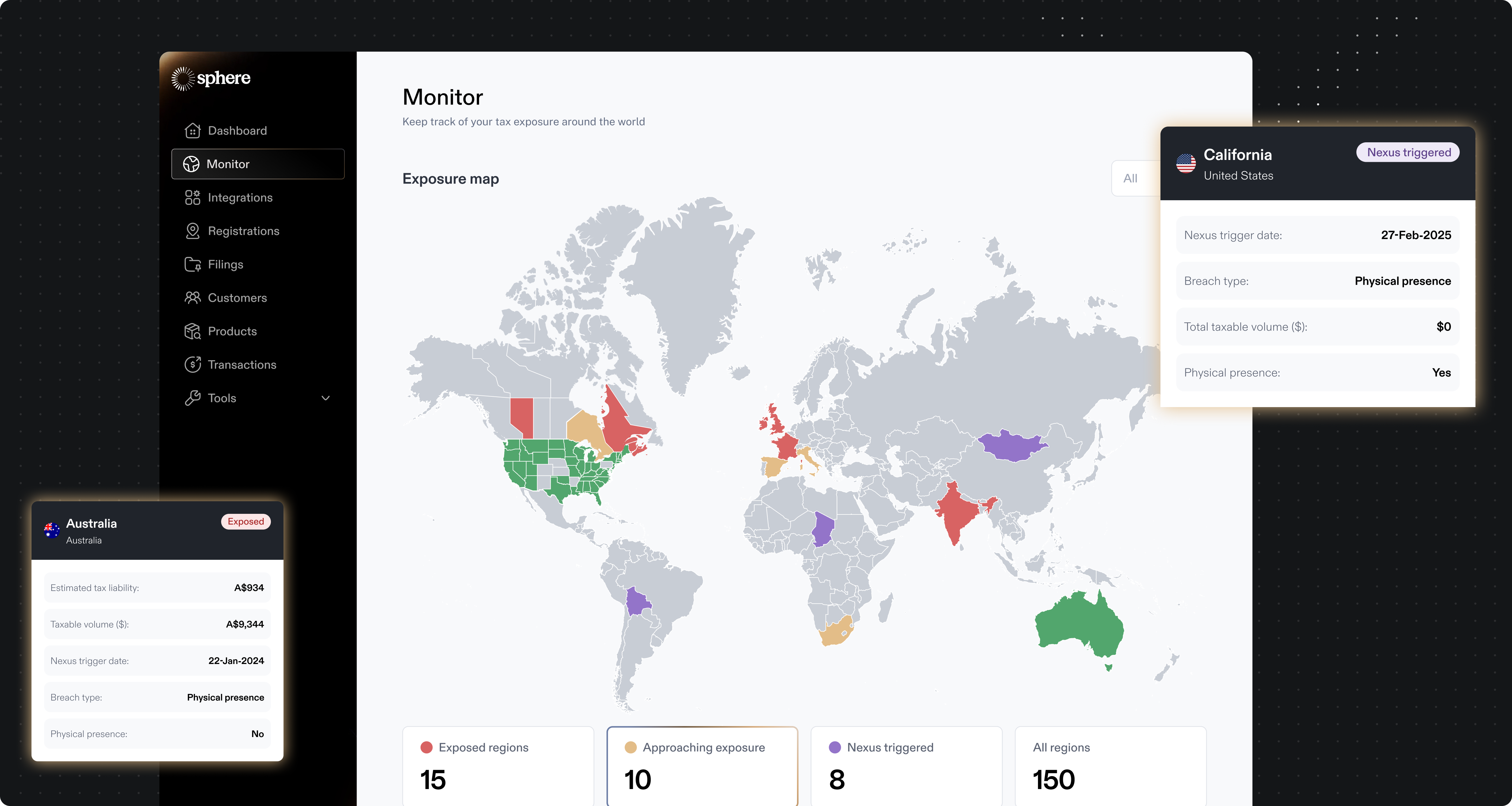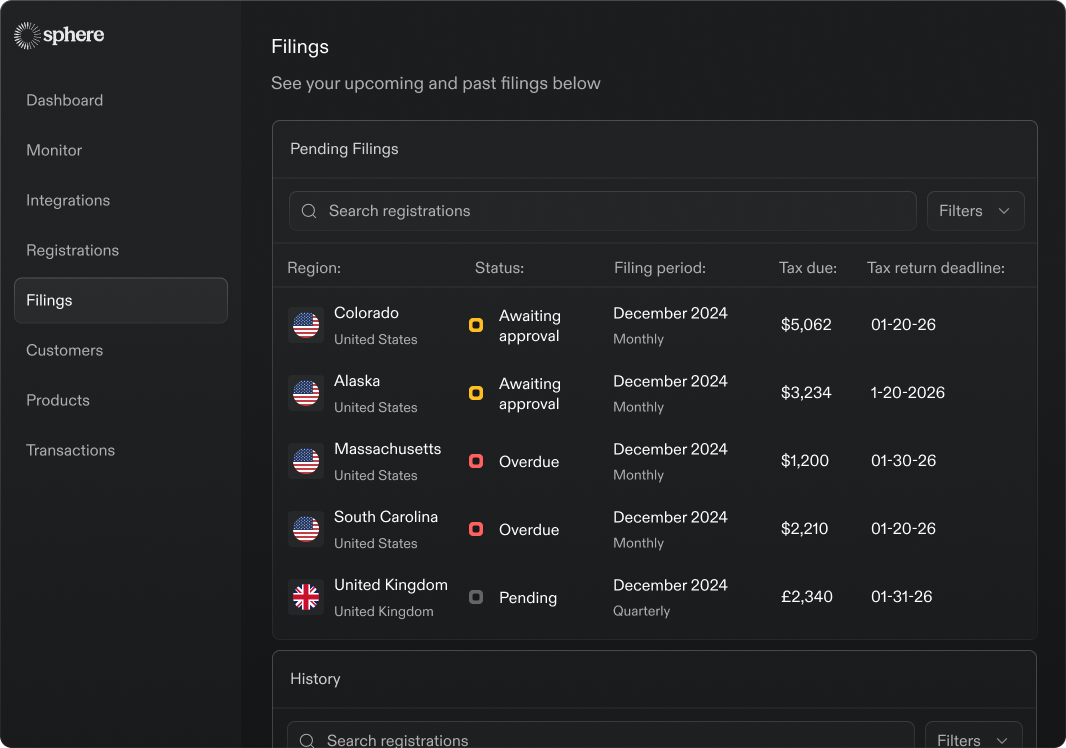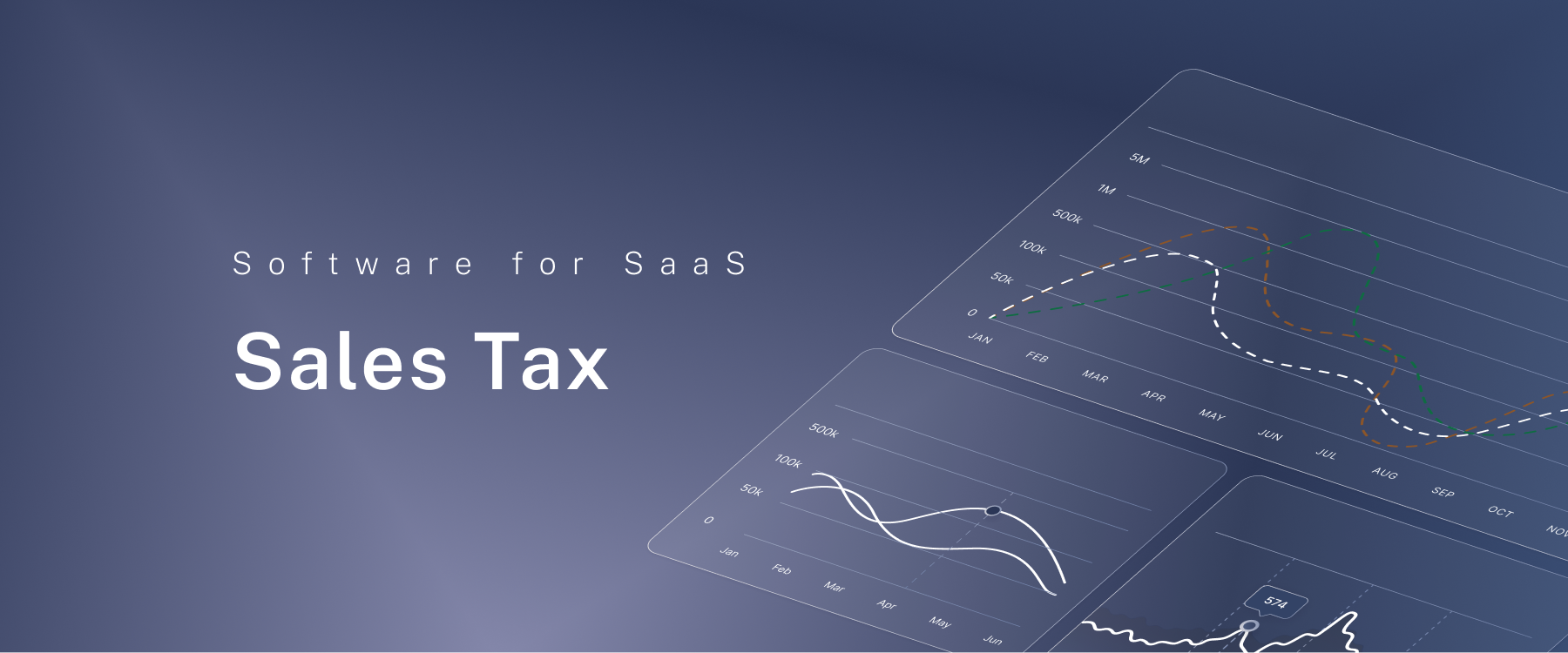.png)
Choosing the right sales tax automation solution can make or break your SaaS or ecommerce business. With economic nexus laws creating more tax obligations across more US states than ever before, knowing your liability, collecting the right rates, and filing and remitting sales tax on time are becoming even more of a challenge. And that challenge only grows when your business expands internationally.
Handling sales tax in just the US alone is nearly impossible without automation. This guide compares three leading sales tax platforms, Avalara, TaxJar, and Sphere–to help you determine which sales tax compliance tool is right for your business. We'll break down each solution's strengths, weaknesses, and ideal use cases, plus examine pricing structures and key features that matter most for e-commerce and SaaS businesses.
Whether you're a small business just hitting economic nexus thresholds or a SaaS business expanding internationally, the right tax automation platform should streamline compliance, reduce errors, and grow with your business.
.png)
Overview of TaxJar
TaxJar, a Stripe company, is a US-focused sales tax software designed specifically for small businesses, ecommerce companies and SaaS service providers. TaxJar centers around four core capabilities: real-time sales tax calculations, economic nexus tracking, AutoFile for automated sales tax returns, and comprehensive tax reporting.
With a strong focus on integrations, the platform connects seamlessly with popular ecommerce platforms and accounting software. For businesses with custom requirements, TaxJar offers API access for developers.
Strengths
Built for quick implementation by companies of all sizes, TaxJar excels in ease of use with quick setup and clear, transparent pricing. Integrations with common ecommerce and accounting platforms like Shopify, WooCommerce, Amazon, QuickBooks, and Stripe are particularly robust, making it simple to sync your business’s multi-channel data.
TaxJar’s AutoFile stands out as a reliable solution for automated sales tax filing and remittance, while the knowledge base provides helpful guidance for common compliance questions. The platform is well-suited for SMB and mid-market e-commerce and SaaS businesses operating primarily within the U.S.
Weaknesses
TaxJar’s biggest limitation is its lack of international coverage. There is no VAT or GST support for businesses selling globally. And because it's geared toward smaller businesses, it also offers fewer advanced ERP integrations compared to more enterprise-oriented solutions. This means it may lack the deep or customizable functionality needed by larger organizations.
While pricing is transparent, customers may face overage fees for filings that exceed their plan limits, and the platform has scalability constraints for complex, multi-entity organizational setups.
Ideal Customer
TaxJar is great for US-centric SaaS and ecommerce businesses that prioritize predictable pricing, fast deployment, and straightforward and uncomplicated tax management and automation, particularly if they have no need for international tax compliance.

Overview of Avalara (AvaTax)
Avalara positions itself as enterprise-level sales tax software for businesses that operate both in the US and internationally, with the ability to handle both the complexities of US sales tax as well as VAT and GST.
AvaTax is a comprehensive suite of tools that includes AvaTax real-time tax calculations, automated return filing, exemption certification management (CertCapture), and extensive integrations with ecommerce platforms, accounting systems, and ERPs.
Strengths
Avalara emphasizes US tax compliance as well, but also outsources international tax compliance in order to provide multi-country support under one umbrella. The platform provides deep coverage of tax rules across thousands of jurisdictions and offers advanced modules for use tax and exemption certificate management.
With hundreds of integrations across ERPs and platforms, Avalara is built to handle high transaction volumes and complex organizational structures. It’s particularly well suited for enterprises requiring multi-country indirect tax compliance, tax exemption management, and sales tax registration across multiple jurisdictions.
Weaknesses
Avalara’s pricing structure is largely opaque, with separate fees for registrations, calculations, and flings. They also charge overages and early cancellation fees, leading many customers to complain that they can’t accurately predict what their final price will be. Implementation of Avalara’s services also tends to be more time-consuming than other solutions.
As a legacy solution, Avalara’s solutions can feel dated, and feature a steep learning curve for users. If some solutions feel bolted-on rather than part of the overall solution, that’s because they have been over the years.
The same goes for multi-country support. Rather than built natively, Avalara generally contracts out to on-the-ground services in other countries, leading to a disconnect in user experience and service quality. Users also report that customer support experiences vary significantly, with response times from days to weeks, and the complexity of the platform can be overwhelming for smaller businesses.
Ideal Customer
Avalara works best for high-volume multi-state companies with complex product taxability requirements, ERP integrations, and a dedicated tax or compliance team that can manage the platform’s complexity.
Is There A Better Alternative to TaxJar and Avalara?
Both TaxJar and Avalara have dominated the sales tax automation market for years, but neither was built with today’s SaaS and AI scale-ups in mind. TaxJar excels for US-centric SMBs while Avalara fits global enterprises, but there’s a significant gap for mid-market SaaS and AI companies who plan to expand cross-border.
Traditional solutions rely on manual tax research, outdated user interfaces, and pricing structures that can become unpredictable as you scale. For growing businesses that need both US sales tax and international VAT/GST coverage without enterprise-level complexity, a new approach is needed.
That's where Sphere comes in: AI-powered tax research, transparent flat pricing, and true global coverage designed specifically for scaling businesses navigating international expansion.

Overview of Sphere
Sphere is AI-powered global tax compliance software built for SaaS and AI companies. The platform handles liability monitoring, registration, calculation, filing, and remittance across sales tax, VAT, and GST jurisdictions worldwide.
Unlike legacy solutions that bolt on international coverage, Sphere was designed as a global platform from day one. The platform emphasizes AI-powered tax research, developer-friendly APIs and user experience, and transparent pricing with a flat fee of $100 per region per month. Sphere focuses specifically on mid-market scale-ups with a product-led growth motion, designed for e-commerce and SaaS businesses expanding internationally.
Strengths
Sphere offers true global tax compliance coverage from day one, handling both US sales tax and international VAT/GST with AI-powered updates to tax rules and rates. The modern user interface and experience works out-of-the-box, requiring minimal training, and implementation is typically faster than legacy solutions.
Sphere’s pricing is a completely transparent $100 per jurisdiction per month. This all-inclusive rate eliminates hidden fees and overages. Customer support operates through Slack, with same-day response times. The developer-friendly API and integrations are built with SaaS teams and finance leaders in mind.
Weaknesses
As a newer entrant compared to incumbents like TaxJar and Avalara, Sphere's integration catalog is still growing. Like any API-first tool, connecting custom technology stacks may require light engineering time, though this is typical for modern software implementations.
Ideal Customer
Sphere is ideal for mid-market SaaS and AI companies with global customers who need both sales tax and VAT/GST coverage in one platform, appreciate modern dashboard design, and want predictable pricing that won't surprise them as they scale.
Feature Comparison: TaxJar vs Avalara vs Sphere
Wrapping Up: What’s The Best Solution For Your Business?
Seeking the best indirect tax automation solution?
TaxJar is best for US-only SMBs who focus on ecommerce or SaaS. It offers predictable pricing, simple setup, and reliable automation, but no global coverage.
Avalara works well for enterprises with complex, multi-jurisdictional requirements. It provides broad tax rules coverage and deep ERP integrations, but comes at a higher cost and complexity, and often requires an in-house team to manage.
Sphere is designed for SaaS and AI scale-ups expanding globally. It combines sales tax and VAT/GST coverage with AI-powered research, modern user experience, flat pricing per region, and fast Slack-based support.
The right choice depends on your business's current needs and growth trajectory. If you're planning international expansion or already selling globally, consider a solution that can grow with you rather than forcing a platform migration later.








.png)

.png)






